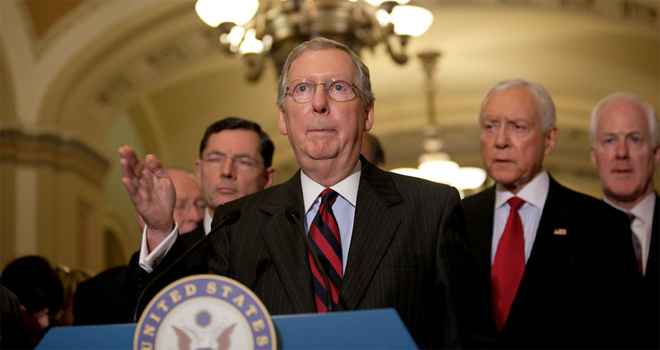The U.S. political world reacted with confusion on Tuesday to a ground-shifting proposal by Senate Minority Leader Mitch McConnell (R-KY).
[TPM SLIDESHOW: Debt Negotiations At The White House]
The plan itself was clear enough: Republicans don’t really have the stomach to allow the country to default on its debt in pursuit of their decades-long goals of slashing deeply into popular entitlement programs. But instead of admitting that and extending President Obama’s borrowing authority through the 2012 election, McConnell proposed a Rube Goldberg-esque scheme by which Obama, by accepting some public embarrassment for himself and his party, could raise the debt limit on his own, with no policy strings attached.
No spending cuts for Republicans. No tax increases for Democrats. In effect, a clean debt-limit hike with all attendant political consequences, such as there are any, falling on the latter.
For hours, nobody in Washington knew what to make of this idea. Some Democratic aides, bruised by McConnell’s past acts of cunning, smelled a trap. White House spokesman Jay Carney left the idea on the table but said that Obama would continue to pursue a grand deal on the debt and deficits. Most conservatives, on and off the Hill, reacted angrily. Rep. Jason Chaffetz (R-UT) tweeted “Don’t know what in the world McConnell in the Senate is thinking. Wow. Stupid idea.”
Grover Norquist took it pretty easy on McConnelll — but with good reason. McConnell’s plan may not shrink the government, but it means his “pledge,” and his goal of no tax hikes, remain inviolate.
But GOP leadership — including House Speaker John Boehner (R-OH) — understood what the Wall Street Journal recognized, but few others did: A fiscal crisis is much too hefty a price for the party and the country to pay, even if it’s to purchase the holy grails of conservatism.
In that sense, yesterday’s development undermined the basic vision of the conservative movement: that decoupling taxes and spending would cause revenue and outlay arrows to diverge; and that when faced with the resulting unsustainable debt load, the country’s representatives, pushed by powerful interest groups, would keep the tax rates and scotch social programs. Choose the corporate state over the entitlement state.
That didn’t happen.
President Obama could use the next three weeks — the window before the government is expected to default — to highlight that failure and press once and for all for an end to the GOP’s anti-tax orthodoxy. What’s unclear now is whether Democrats will capitalize on this moment of weakness for the GOP and its leaders, or squirm out through the same escape hatch right behind them.
Congressional leaders will convene at the White House again on Wednesday afternoon, presumably to keep working toward a deal. We shall see.






